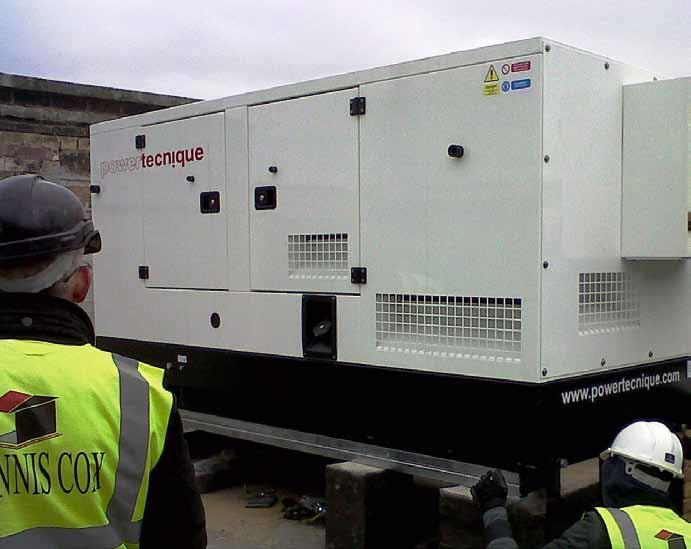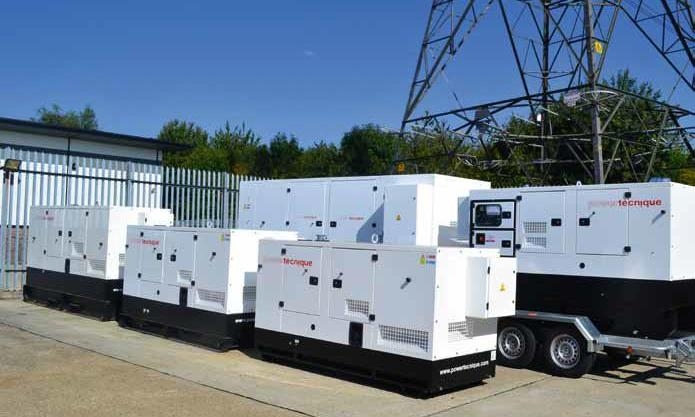The UK is facing a future where our white goods could be turned off remotely by The Grid as demand dramatically outstrips our domestic supply. We will have no option but to import what power we need to meet our consumption requirements and keep education online.
Here, Darren Pearce, Managing Director of Powertecnique looks at the rapidly approaching energy gap and examines possible ways forward, including the importance to universities and higher education facilities of back-up power supplies.
“The Grid capability is falling short now and without some quick policy making and significant investment the situation could mean we all have our power turned off when we least expect it – that is institutions as well as domestic users. In my opinion delays in agreeing to the building of new nuclear power stations is an error, leaving the country in a vulnerable position. Although there has been serious development of alternative green solutions, especially wind power, we are still in an insecure situation for the future. Unfortunately when the wind is not blowing you get no output. So we need back-up.
Since the closing of coal powered power stations because of dirty emissions, there was a rush to gas turbines as the replacement back-up solution, but the North Sea supply is soon to run out. We are looking at a UK that will not be able to generate the capacity required to run the country. This leaves us in the precarious position both economically and politically of having to import a significant part of our energy supply.
 Shale gas, extracted by hydraulic fracturing ("fracking") of rock formations, is the latest champion of the supply sector and does offer a potential solution to this uncomfortable scenario. Last year Centrica announced its investment of £160M into fracking fields around Blackpool. However fracking is not without controversy. Opponents claim that it is harmful to the environment, leading to water pollution, methane leakage and seismic activity, as well as the industrialization of the countryside. It also represents big investment in yet another fossil fuel rather than a renewable resource.
Shale gas, extracted by hydraulic fracturing ("fracking") of rock formations, is the latest champion of the supply sector and does offer a potential solution to this uncomfortable scenario. Last year Centrica announced its investment of £160M into fracking fields around Blackpool. However fracking is not without controversy. Opponents claim that it is harmful to the environment, leading to water pollution, methane leakage and seismic activity, as well as the industrialization of the countryside. It also represents big investment in yet another fossil fuel rather than a renewable resource.
As a result of these supply concerns and a continually high energy consumption rate, it may just be that the future will include widespread installation of so-called smart meters and smart-devices in schools and universities. These advanced technologies allow utility companies and The Grid to better track and manage energy used by customers, aiming to increase efficiency, lower costs, and reduce pollution.
The Grid is required by law to balance supply and demand in the network. It is already allowed to shut down power to industrial firms to balance the grid. Now it is asking that all new appliances including electric ovens and air-conditioning units be fitted with sensors that could remotely shut them down when the UK's generators struggle to meet demand for electricity supply. Counterparts in 34 European countries are supporting the proposal and such appliances could be in the shops in less than three years.
There is already some public resistance to the big brother approach, and scepticism surrounding potential additional revenue streams which could then be made possible for the big supply firms and producers alike. However I believe without an alternative, their implementation is likely to become necessary and commonplace.
Other European members are pursuing a variety of different energy strategies for the future depending upon their existing infrastructures, consumption requirements and investment levels. Germany announced a moratorium on nuclear power as a reaction to the disaster in Fukushima, Japan in 2011. The country had already surpassed the 20% threshold for renewable power supply and is home to 37% of the world’s solar plants. The governing coalition has to date shut down roughly 40 percent of the country's nuclear generating capacity.
Meanwhile France, the world's most nuclear dependent nation, with 58 power reactors and deriving 75% of its supply from nuclear power, is focusing on security development. As the world's largest exporter of electricity the country is active in advancing new nuclear technologies and is building its first Generation III reactor. Flexblue is another new generation project involving a submerged nuclear power plant concept, which would be housed in a submerged 12,000 ton cylinder, offshore at about 100 m depth. Subject to approval, construction could start on a prototype unit this year ready for launch and deployment in 2016.
In my opinion nuclear power is still the most reliant and viable solution for the UK. Wind farms and the like are less predictable than traditional power stations, increasing the risk of blackouts. Whilst developing renewable energy production is important, reliability and consumption levels are inescapable factors for which the country must plan and new nuclear power is the closest we have to a green solution today.
However, there aren’t currently enough nuclear reactors to meet with demand and the amount of energy we are currently using, so the potential energy gap means that we won’t have sufficient energy to service everyone in the UK and the risk of power cuts will be so much higher. The government may ask educational facilities and businesses to close between 4pm and 8pm to prevent an energy crisis.
So what will they be able to do about it? One answer is to gear up with back-up power supplies: UPS systems (Uninterruptible Power Supplies) and diesel generators.

Another is to export power back to the grid.
UPS units work instantaneously when power is turned off, because the UPS transfers the load onto a battery for an emergency period of time. Standard units last up to five or ten minutes, with the maximum reaching around 30 minutes.
This is where a diesel generator comes in. The UPS is able to facilitate a controlled shut down so that there is time for the diesel generator to power up and run in the event of a power switch-off.
Diesel generators can’t pick up the load immediately as it takes time to warm up and get to full capacity to manage the load. The load step represents how much of the load the generator can support. For example, if a 120kVA UPS generator has a load step of 50%, it only takes 60kVA when it first turns on, and takes time to manage the remainder. We test this with a load bank which simulates a UPS/generator with the electrical load to make sure that it can carry the supply.
UPS batteries only have a shelf life of ten years, and that’s when they are stored in the right conditions so in the face of the Energy Gap 2015, we need to get even better at ensuring people keep their equipment serviced and ready for use at any time.
Businesses and educational facilities can currently feed power back to the grid at a good rate, and our engineers design solutions for doing this. Short term operating reserve (STOR) is a service that creates additional revenue sources for power users, typically generating around £7000/MW per year plus fuel and operating costs. So it’s revenue that offsets power costs, but that also supports the preservation of valuable power for all.
Working with critically important organizations such as universities and colleges, we already know how to support businesses if there is an accidental lapse in power from the grid, and how to export unused power back to the grid. So we feel responsible for educating companies about the need to protect their power supplies during potential intentional shut downs, and to preserve existing power rather than wasting it. None of our customers’ organizations currently notice an operational difference if the grid suddenly fails them and our UPS and generators take over. We want to make sure this is the case in all critical organizations across Britain.
For further information please visit www.Powertecnique.com


